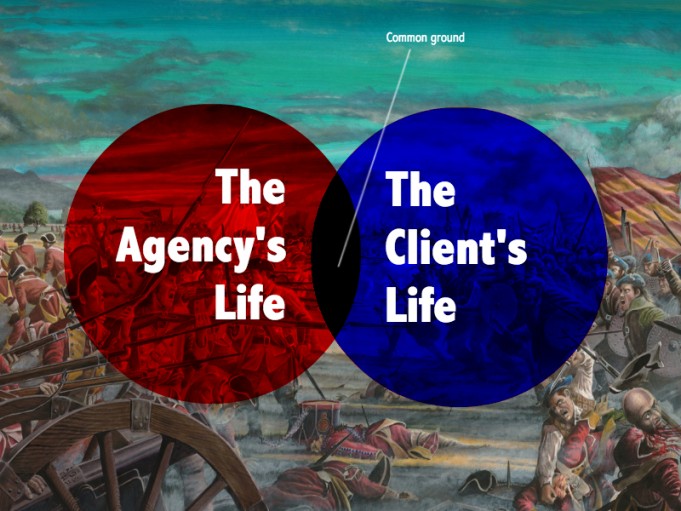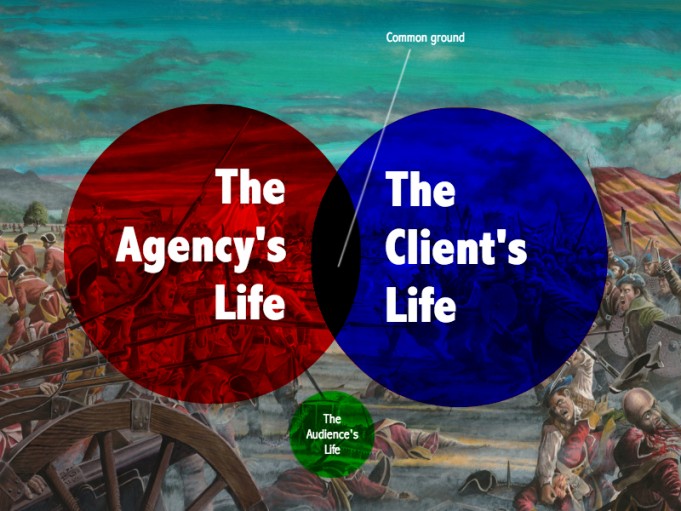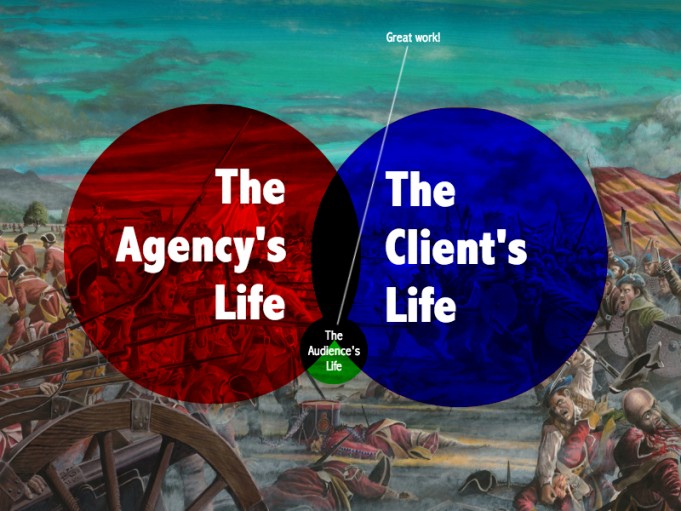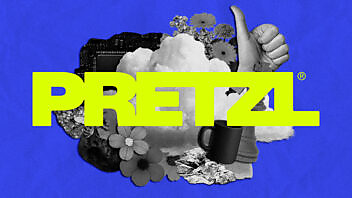For the entirety of the two and half a minutes that I’ve been an adult professional of any contributory value, I’ve erred on the side of naivety. If for no other reason than to be a contrarian in a world I’ve cynically derided as being cynical, I want to feel like I’m fighting a good fight.
In an agency, there are typically two good fights and it’s nearly impossible to say which one is good-er. The first good fight is the creative good fight. This is the fight to make the best creative work anyone’s ever made. As a writer, I’m typically supposed to be in the infantry of the army of great work.
The second good fight is the client’s good fight. This is the fight to make sure the client gets what they want/what they need/what they didn’t know they need or whatever we’re supposed to be calling it in public these days. This is usually the messier of the two good fights and I’ll tell you why. (As I’ve come to learn, this fight is very much my business too.)
The client is usually mostly busy doing what clients do so they can afford to have relationships with agencies. Meanwhile agencies are usually mostly busy doing what agencies do so that clients can do what they do. The problem is that only a fraction of these activities actually overlap.
And when they do, there is naturally a load of disagreement. Like a couple coming home after a long day’s work, the expectations are usually higher than the energy levels will permit performance to be at that moment. In the ensuing disappointment, it’s easy to forget a crucial truth:
The creative good fight is not a fight against the client’s good fight.
This might sound obvious in a blog post about ‘relationships’, but in practice this is a massive, massive, massive truth nobody can afford to forget. Because at the bottom of the venn diagram of compromise is the audience.
These are the ‘kids’ (to choose an unnecessarily patronising analogue) in the relationship.
Sure Mommy and Daddy had a tough day. But they had a tough day because they were both fighting good fights. And they were fighting good fights because they value the ‘kids’. Turns out, the creative good fight and the client good fight, are really just two rounds of the same bout.
Creatives have stupid instincts about things non-creative
I’ve been saying the client agency relationship shouldn’t be war-like long before I knew what it actually meant in practice. From the outside the bigger picture is always easier to see. But on the inside, it can be extremely easy to forget. And over the last couple of weeks, I’ve been teetering on the brink.
It would be easy to conclude that the client is stupid and wrong and incapable of allowing good work to happen. This is because, in my experience, this is how a lot of creatives tend to treat clients. Hell, it’s how creatives bond when they meet new creatives at a party.
“Fucking clients! Am I right?”
It’s a deeply ingrained ‘truth’ in our industry and it’s a stupid lie based on a zero sum mentality that is directly at odds with real life.
Because it gets in the way of good work.
My experience so far at Velocity has been that we tend to tilt towards the authority of our account people. Sure, we’re creative heavy and we get to do some pretty crazy stuff, but at the end of the day, I’ll do what the account people think is the right thing to do.
This isn’t because they’re the best account people I could dream of – which they are. It’s because they’re the only ones who seem to get that the creative good fight and the client good fight are typically the same thing. They’re the generals conducting the battle. They aren’t in the way – they’re in charge.
They’re on the client’s side and they’re fighting from our collective corner. So when things have been tough and I’ve been colliding with people on how the work should be, I try to remember the little owl toys one of our clients makes for the account director she works with.
We’re fighting over an eBook and these two are freaking ‘craft buddies’. How does that work?
Fighting the impulse to disagree
My biggest fights have been against my own egotistical urge to believe that the first draft will be a home run. It won’t be and it can’t be. Get over it.
This doesn’t mean the client agency relationship is all holding hands and making pretty art together. It’s a lot of bickering and back and forth and difficult confrontations. But the really great relationships (like the ones the ADs here are part of) are ones where the confrontation’s allowed.
Because guess what, there’s a way bigger, good-er fight that we’re an active part of. It’s a fight against the competition. It’s a fight for the audience’s attention and interest. It’s an urgent fight, it’s an important fight and it’s a fight we will lose if we keep bickering over the size of the fucking logo.
Kool-aid: the elixir of process
There’s no one answer for who should compromise more or whose opinion is more valuable. We just have to figure it out when we get to it. (Far greater minds than mine have explained how this works here.)
But whenever there’s compromise, it’s usually because one side decided to just trust the other side. It might feel like you’re giving up, but really you’re just giving in. You’re sipping their kool-aid and hoping it works out.
And when it’s a relationship everyone wants to be a part of (ie everyone’s drinking each other’s kool-aid) it usually does work out. We’re picky about who we work with, so we genuinely wish they succeed. And they’re picky about who they work with, so they genuinely expect great work.
Turns out a little bit of naivety can go a long way.

Enjoyed this article?
Take part in the discussion











Comments
Rod Hirsch March 27th, 2014
Another good post, Harry.
I think you’re right to highlight trust as the key factor. It has to be earned, and it’s a two-way street.
Alastair Crompton’s book ‘The craft of copywriting’ contains much good advice, but the thing that stuck with me was his phrase “think like a creative, talk like an accountant”.
In other words, before you start running off at the gob about Philistine clients desecrating your art, make sure you can justify why they should trust you with their budget.
Cheers
Rod
Harendra Kapur March 27th, 2014
Cheers Rod!